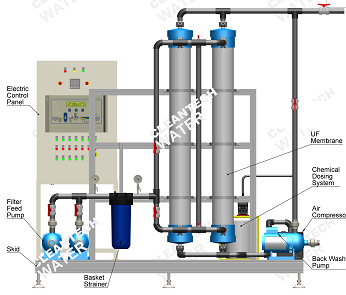Clean, safe, and reliable water is a fundamental requirement for households and businesses alike. As concerns about water quality continue to grow, many individuals are turning to advanced water treatment technologies to ensure the purity of their water supply. Ultrafiltration (UF) is a cutting-edge solution that effectively removes contaminants, bacteria, and particles from water, providing a superior water treatment method for residential, commercial, and industrial use.
In this detailed guide, we will delve into the fundamentals of ultrafiltration water treatment, explore its applications, understand the intricate working mechanisms, and thoroughly analyse the benefits it offers.
 What is Ultrafiltration Water Treatment?
What is Ultrafiltration Water Treatment?
Ultrafiltration is a sophisticated water treatment process that employs semi-permeable membranes to sift out impurities from water, thereby ensuring a clean and safe water supply. This process effectively eliminates contaminants that can adversely affect the taste, odour, and overall quality of water.
Point-of-use (POU) Ultrafiltration Systems:
Designed for under-the-counter applications, point-of-use ultrafiltration systems are tailored to meet the specific needs of homeowners who prioritise having a dedicated purified water source for drinking and cooking. These systems are compact, space-efficient, and deliver high-quality water directly from the tap.
Point-of-entry (POE) Ultrafiltration Systems:
In contrast, point-of-entry ultrafiltration water treatment systems are engineered for broader applications where water usage extends beyond drinking and cooking. Commercial properties, for instance, benefit from point-of-entry systems as they provide purified water for a variety of applications such as cleaning, irrigation, and manufacturing processes.
How It Works
The intricate process of ultrafiltration involves using semi-permeable membranes with minute pores, typically ranging from 0.1 to 0.001 micrometres. These membranes act as a barrier, allowing water molecules to pass through while blocking larger particles, contaminants, and microorganisms. Applying pressure during the process facilitates the filtration, ensuring only clean water permeates the membrane.
- Pre-filtration: Before entering the ultrafiltration system, water undergoes a pre-filtration stage to remove larger debris and sediments. This preliminary step is crucial in preserving the longevity and efficiency of the UF membrane.
- Membrane Filtration: Once pre-filtration is complete, the water progresses to the core of the process—the membrane. The ultrafiltration membrane, characterised by its small pore size, acts as a highly effective sieve, separating particles such as bacteria, viruses, and suspended solids from the water. Only clean water molecules are permitted to pass through.
- Post-filtration: The purified water may undergo a post-filtration stage to enhance its quality following the process. This stage may involve additional filters or treatments to eliminate any remaining impurities, ensuring the water meets the highest standards of cleanliness.
UF Membrane Characteristics
The efficacy of ultrafiltration water treatment systems is intrinsically tied to the characteristics of the membrane employed in the process. Understanding these properties is essential for selecting the right system for specific applications.
- Pore Size: Ultrafiltration membranes boast smaller pore sizes than microfiltration, ranging from 0.1 to 0.001 micrometres. This critical feature enables them to filter out bacteria, viruses, and other minute particles that may compromise water quality.
- Material Composition: UF membranes are typically crafted from polyethersulfone, polysulfone, or cellulose acetate. The selection of membrane material depends on the specific application and the types of contaminants expected in the water source.
- Durability: UF membranes are renowned for their durability and resistance to fouling. This characteristic makes them highly suitable for long-term use with minimal maintenance requirements, ensuring a reliable and consistent water purification process.
- Backwashing Capability: Many UF systems are equipped with this feature that facilitates the cleaning of the surface. This mechanism prevents clogging, extends the life of the membrane, and maintains optimal filtration efficiency over an extended period.
Benefits
Investing in ultrafiltration water treatment systems for residential or commercial use offers many benefits beyond ensuring a clean water supply. Let’s delve into each of these advantages in greater detail:
- Improved Water Quality: Ultrafiltration systems excel in removing contaminants, ensuring that the water supplied is of the highest quality. This is particularly crucial for both drinking and various applications within commercial properties.
- Enhanced Taste and Odor: By effectively eliminating impurities, ultrafiltration significantly improves the taste and odour of water. The result is a more pleasant and refreshing drinking experience for homeowners and employees alike.
- Space-Efficient Design: Point-of-use systems are highly effective, compact, and space-efficient. These systems can be seamlessly integrated under the counter, ensuring they do not encroach on valuable kitchen space.
- Versatility in Applications: Point-of-entry systems cater to a wide range of water applications within commercial settings. Whether for cleaning, irrigation, or manufacturing processes, these systems offer versatility to meet various needs.
- Cost-Effective Solution: Ultrafiltration presents a cost-effective solution for maintaining water quality. It reduces the reliance on bottled water, eliminating the need for frequent purchases and expensive water treatments.
- Environmental Sustainability: Choosing contributes to environmental sustainability by reducing reliance on single-use plastic bottles. This shift toward eco-friendly practices aligns with a growing global awareness of the importance of sustainable water consumption.
- Ease of Maintenance: Designed with user convenience, UF systems are known for their easy maintenance. Some systems even feature automated cleaning processes, reducing the burden on homeowners or property managers and ensuring long-term efficiency.
What Does Ultrafiltration Remove?
Ultrafiltration is a highly efficient water treatment process that removes a broad spectrum of contaminants, ensuring the delivery of clean and safe water. Here are the types of impurities and particles that it effectively eliminates:
- Bacteria and Viruses: UF membranes, with their small pore sizes, act as a formidable barrier against bacteria and viruses, preventing them from passing through and reaching the treated water.
- Suspended Solids: Minute particles and suspended solids, which may contribute to cloudiness or turbidity in water, are effectively filtered out during the ultrafiltration process.
- Protozoa and Cysts: It can capture larger microorganisms, including protozoa and cysts, ensuring the water remains free from these potential health hazards.
- Sediments and Rust: Pre-filtration stages in the system target sediments and rust, preventing them from entering the core membrane filtration process and safeguarding the membrane’s longevity.
- Organic Matter: Many organic contaminants, including chemicals and pesticides, are successfully removed, leading to an improvement in water quality.
Difference Between Ultrafiltration and Reverse Osmosis Systems
While ultrafiltration (UF) and reverse osmosis (RO) are advanced water treatment technologies, their mechanisms and applications differ. Homeowners and commercial property owners need to understand these differences to decide on the most suitable system for their specific requirements.
Pore Size and Filtration Mechanism:
- Ultrafiltration (UF) Water Treatment: UF systems employ semi-permeable membranes with larger pore sizes, typically ranging from 0.1 to 0.001 micrometres. This allows water molecules to pass through while blocking contaminants like bacteria, viruses, and larger particles. UF is highly effective in improving water quality without removing essential minerals.
- Reverse Osmosis (RO): RO systems, on the other hand, use membranes with significantly smaller pore sizes, typically around 0.0001 micrometres. This results in a more thorough filtration process that removes contaminants and also a majority of minerals. RO is renowned for producing extremely pure water, but it may lead to a reduction in essential mineral content.
Application:
- Ultrafiltration (UF) Water Treatment: UF is well-suited for various applications, including point-of-use systems for homes and point-of-entry systems for commercial properties. It balances effective filtration and retaining essential minerals, making it ideal for everyday water consumption.
- Reverse Osmosis (RO): RO is commonly employed for applications where an exceptionally high level of water purity is required, such as in laboratories or specific industrial processes. It is often used for point-of-use systems in homes where removing minerals is acceptable.
Maintenance Requirements
Ensuring the continued efficiency of an ultrafiltration water treatment system requires adherence to specific maintenance practices. Regular care extends the lifespan of the system and guarantees the consistent delivery of high-quality water. Here are the essential maintenance requirements:
- Regular Cleaning: Periodic cleaning of the ultrafiltration membrane is essential to prevent the accumulation of contaminants and debris. Some UF systems feature automated backwashing, simplifying the cleaning process.
- Pre-filtration Check: Monitoring and, if necessary, replacing pre-filters is crucial to prevent larger particles from reaching the UF membrane. Regular pre-filtration checks maintain optimal system performance.
- Membrane Inspection: Regularly inspecting the membrane for signs of damage or fouling is essential. Timely identification and resolution of membrane issues contribute to sustained filtration efficiency.
- Monitoring Pressure Levels: Monitoring the pressure levels during ultrafiltration helps identify any irregularities. Maintaining the recommended pressure range ensures the proper functioning of the system.
- Replacement of Consumables: Components such as seals, O-rings, and other consumables should be replaced at recommended intervals. This preventive measure contributes to the overall reliability of the system.
- Professional Servicing: Periodic servicing ensures a thorough assessment of the system’s condition. Professionals can identify potential issues and undertake necessary repairs or replacements.
Frequently Asked Questions About Ultrafiltration Water Treatment Systems
Q: What are some practical applications for ultrafiltration systems?
A: Ultrafiltration water treatment finds diverse applications, ranging from residential to commercial settings. For homeowners, point-of-use systems deliver purified water directly for drinking and cooking. In commercial properties, point-of-entry systems cater to broader water needs, including cleaning, irrigation, and manufacturing. The versatility of ultrafiltration makes it an ideal choice for various water treatment requirements.
Q: How do you install an ultrafiltration water system?
A: Installing this system is a straightforward process. Begin by selecting an appropriate location, preferably close to the water source. Connect the system to the water supply, ensuring a secure fit. Position the system’s membrane correctly and initiate the pre-filtration process. Installation is often under the counter for point-of-use systems, while point-of-entry systems are typically integrated into the main water supply line. Follow the manufacturer’s guidelines for specific instructions tailored to your system.
Q: How do you know when to switch the filter in your ultrafiltration system?
A: Regular monitoring is crucial to determine when to replace the filter in your ultrafiltration water treatment system. Many modern systems feature indicators that signal when the filter reaches the end of its lifespan. Additionally, a decline in water flow or a change in water taste may indicate a clogged or exhausted filter. Refer to the system’s manual for recommended filter replacement intervals and follow a routine maintenance schedule to continuously deliver clean and safe water.
Get Installation and Maintenance Service for Ultrafiltration Water Treatment Systems
Experience the pinnacle of water purity with our cutting-edge ultrafiltration water treatment systems. Elevate your lifestyle by securing installation and maintenance services that redefine excellence. At Cleantech Water, we pride ourselves on delivering not just water treatment but a promise of uncompromising quality. Our skilled technicians ensure seamless installation, maximizing the efficiency of your system.
Trust us to safeguard your investment with meticulous maintenance, guaranteeing a continuous flow of pristine water. Act now and embark on a journey towards unparalleled water clarity and safety. Book a consultation today for installation and maintenance services and receive the best quality water, because your health deserves nothing less. Contact us at +91-9558996411 or write to us at info@cleantechwater.co.in to inquire more about our products.

